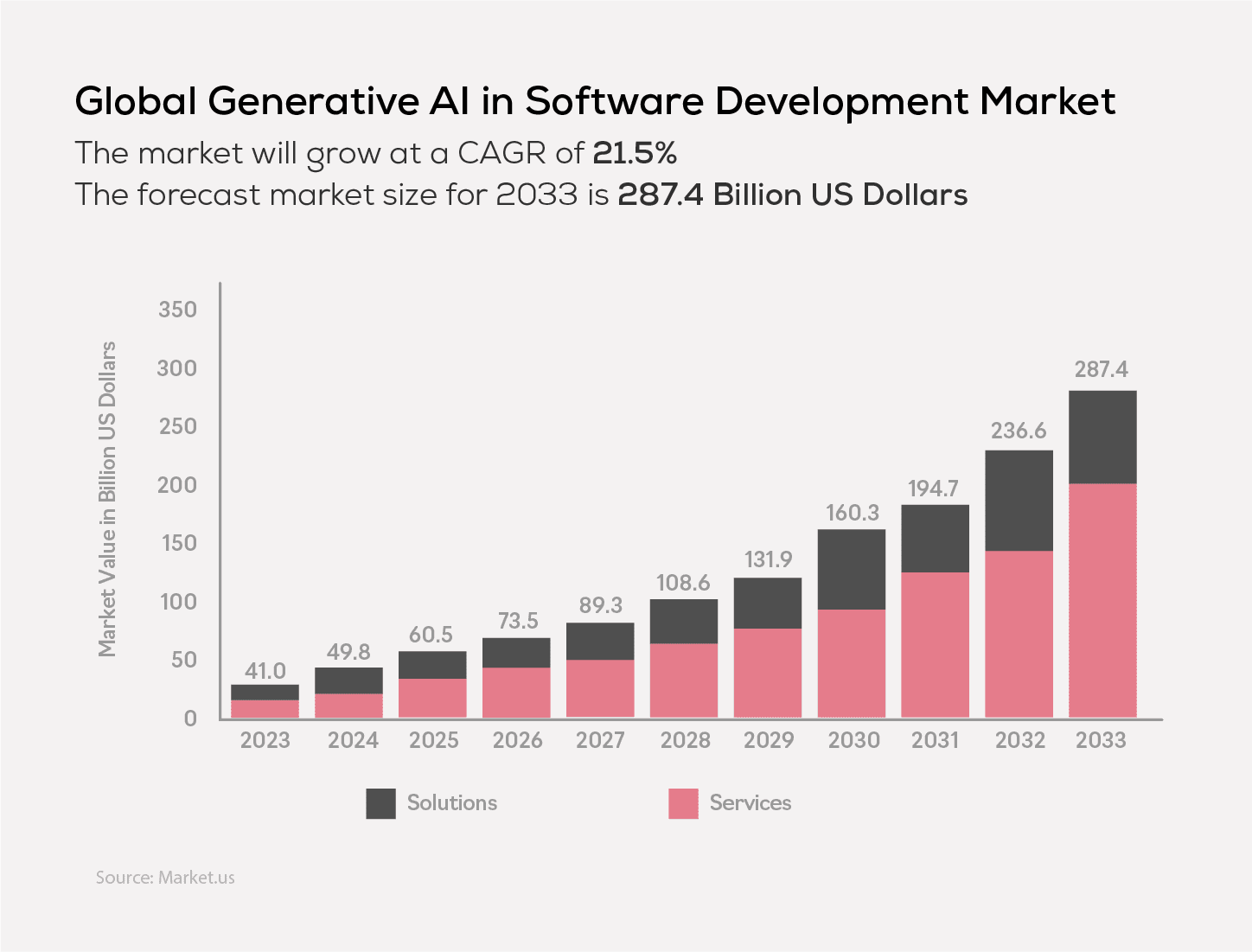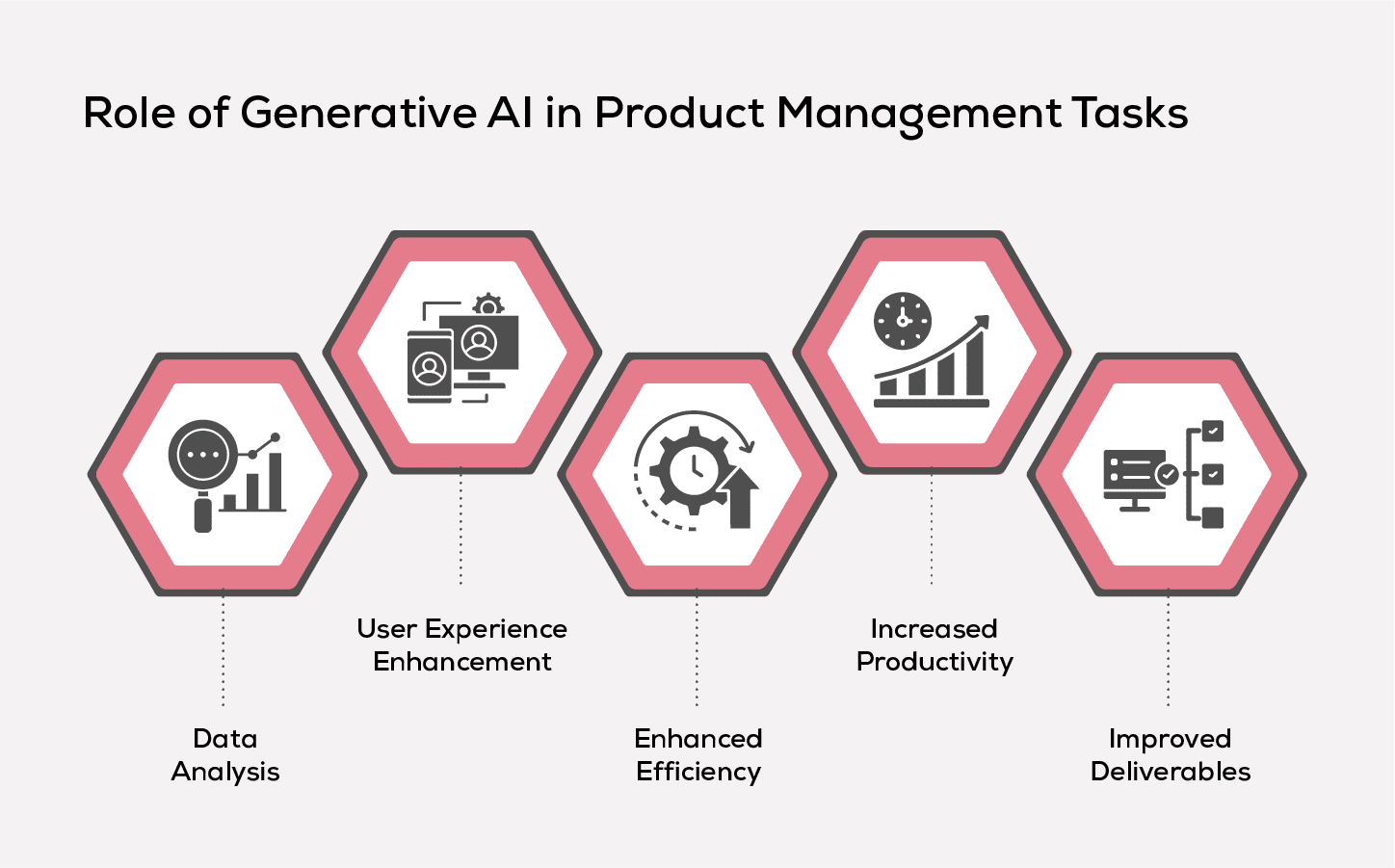In today’s rapidly evolving digital landscape, generative AI is emerging as a transformative technology, impacting various sectors and changing how we solve complex problems. For software development, speed and efficiency are no longer critical but essential. To stay competitive, organizations must accelerate their product-to-market timelines. But how can they achieve this?
The software development landscape is shifting and traditional methods are struggling to keep up with the industry needs. The speed at which companies can bring in innovative projects determines their survival in the market. Generative AI comes to the rescue by providing a way to meet these demands more efficiently.
Ready to witness how generative AI is reshaping the software development landscape? Here is the forecast: By 2033, the global market for generative AI in software development is anticipated to reach USD 287.4 billion, from USD 41.0 billion in 2023, with a CAGR of 21.5% during the 2024-2033 forecast period.

Before diving deeper into the topic, here are some interesting findings on how Generative AI is impacting the industry:
-
The use of Generative AI in software development results in cost savings of up to 25%.
-
Professionals with expertise in generative AI and software development are expected to reach 30% in the job market.
-
McKinsey research highlights that Product Managers (PMs) using gen AI can speed up time to market by 5% and enhance productivity by 40%.
In today’s dynamic business landscape, software product managers are the driving force behind product innovation and success. To understand customer needs, PMs are shifting their focus towards generative AI, a technology that has experienced rapid growth in recent times. The role of product managers has undergone a significant transformation, driven by trends like cloud computing, customer-centric design and data-driven decision-making. As generative AI emerges, the PM role is expected to evolve, redefining how products are developed and delivered.
Role of Generative AI in Product Management Tasks
AI is transforming the product management function, enabling PMs to employ AI-driven capabilities in automation, data analysis and predictive analytics. Successfully integrating AI into product management requires planning, collaboration and attention to ethical issues. By recognizing these critical factors, organizations can ensure that AI adoption is effective and responsible. As AI technology continues to evolve, product managers are discovering innovative ways to harness its power across the product lifecycle. Let’s take a closer look at the ways AI is being implemented in product management.

1. Data Analysis
AI algorithms can be utilized in multiple ways to extract valuable insights from the vast amounts of data collected from user interactions, internal analytics and market research.
2. User Experience Enhancement
AI enables product managers to create personalized user experiences by segmenting users based on their behaviours and individual preferences. This allows for personalized product recommendations and experiences, resulting in increased engagement and retention.
3. Predictive Analytics
AI algorithms provide data-driven market trends and demand patterns, allowing product managers to make informed decisions and stay ahead in the rapidly changing market needs. This ensures the product managers to predict the user needs, improve product features and increase user saisfaction.
4. Increased Productivity
Generative AI is transforming the product management landscape by automating routine tasks, allowing product managers to focus on creativity, problem-solving and driving business growth. By utilizing AI tools, teams can assist by generating innovative products based on current market trends.
5. Improved Quality of Deliverables
Implementing generative AI results in more accurate and complete outputs. With a focus on strategic planning and innovation, product managers can enhance the overall quality of their products, driving business success and customer satisfaction.
5. Reduced Cost
AI technology analyses the data and areas of inefficiency, enabling the implementation of changes that minimize waste and reduce cost.
The Impact of Generative AI on Time-to-Market
The success of a product launch involves a timeline and staying on track to meet deadlines. Challenges are part of this process, and it is essential to address them. Generative AI allows product engineers to create and evaluate multiple design variations, allowing them to streamline the development process and address issues. It enables engineers to witness design challenges from various angles by providing a more agile and adaptive development process. Further, by overcoming the challenges, organizations can create market-ready products while minimizing costs.
To achieve success in product engineering, it is crucial to establish a clear vision, maintain an adaptable environment and respond to dynamic market needs. Generative AI’s advanced algorithms enable engineers to produce a wide range of scenarios, ensuring they are prepared for challenges and deliver high-quality customer experience.
Wrapping Up
The integration of AI in product development is transforming the way organizations innovate, design and bring products to market. Its impact is felt throughout the product development lifecycle, from generating ideas to launch. Organizations that adopt AI-powered data analysis can gain a competitive advantage, as they can respond quickly to changing market conditions and customer needs. Further, AI-powered designs enable continuous testing, refinement and adaptation, ensuring the product remains competitive in rapidly changing markets.
As we implement AI to revolutionize product development, it is essential to address the ethical implications of this technology. However, AI has the potential to transform the products, it is also important to raise concerns about accountability, bias and privacy.







